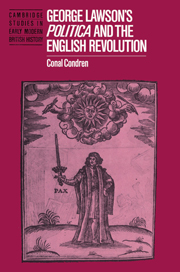Book contents
- Frontmatter
- Contents
- Preface
- Texts used and a concordance for the ‘Politica’
- List of abbreviations
- PART I Historiographical And Biographical Preliminaries
- PART II An Exposition Of Lawson's Politica
- PART III An Examination Of The Politica
- 7 Providence and rhetoric
- 8 Community, representation and consent
- 9 Settlement and resistance
- 10 From Civil War to settlement
- PART IV The Fate Of The Politica From The Settlement To The Glorious Revolution
- PART V Conclusions
- Index
- Cambridge Studies in Early Modern British History
9 - Settlement and resistance
Published online by Cambridge University Press: 04 November 2009
- Frontmatter
- Contents
- Preface
- Texts used and a concordance for the ‘Politica’
- List of abbreviations
- PART I Historiographical And Biographical Preliminaries
- PART II An Exposition Of Lawson's Politica
- PART III An Examination Of The Politica
- 7 Providence and rhetoric
- 8 Community, representation and consent
- 9 Settlement and resistance
- 10 From Civil War to settlement
- PART IV The Fate Of The Politica From The Settlement To The Glorious Revolution
- PART V Conclusions
- Index
- Cambridge Studies in Early Modern British History
Summary
COBWEB
Duncan Forbes has wittily remarked that political theories which make a fetish of resistance are like theories of matrimony which emphasise a general rule for divorce. But as Lawson was concerned with subjection, its problematic limits are necessary preoccupations. To some extent, then, it is fitting that critical attention has been directed to Lawson's alleged theory of resistance. As I have indicated through the preceding exposition, however, it is only in the context of the ecclesiological analogue, separation, that we might begin to see just what his theory might be and how close we come to making a fetish of a ghost in the text: mistaking unwanted guests at the wedding for bride and groom.
To repeat, Lawson's treatment of separation seems clear-cut. He is hostile to the possibility of separation in the present, but in principle the possibility may and has occurred justifiably. In the idiom of William Chillingworth, for example, it is an option that must always be available to the believer in fulfilment of theological duty. But despite the self-consciously analogical structure of the Politica, modern commentators have been unable to agree on whether there even is a concomitant theory of secular resistance.
Salmon's negative assessment may well have been coloured by allowing specifically Huguenot and Calvinist resistance literature to loom too large.
- Type
- Chapter
- Information
- George Lawson's 'Politica' and the English Revolution , pp. 94 - 116Publisher: Cambridge University PressPrint publication year: 1990



